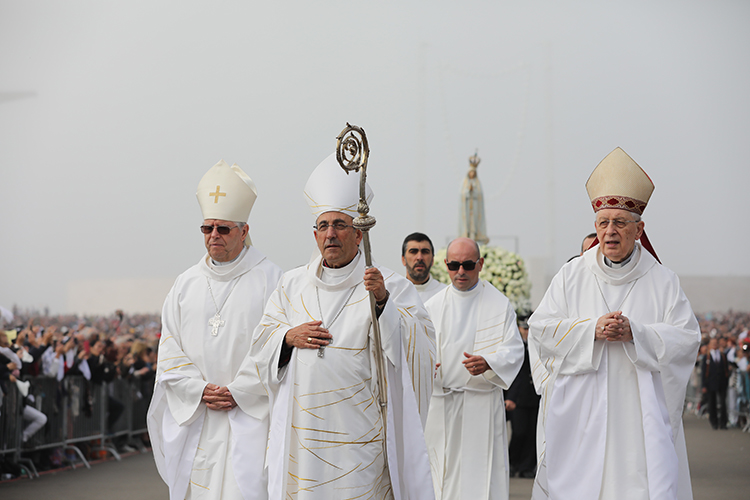13 october, 2017

Last International Pilgrimage of the Centennial year ends with an appeal against the danger of a nuclear warBishop of Leiria-Fatima reminds that Peace is “the core theme of the message” and recalls the appeal of Pope Paul VI made in Fatima
The Bishop of Leiria-Fatima, who closed today the major pilgrimages of the year of the Centennial, stated that the message of Fatima is “a consoling promise of peace and not of destruction” and recalled the words of Paul IV on the 50th anniversary of the Apparitions warning about the threat of a nuclear war “so acute as it was then”. “Tensions between great powers persist, conflicts continue configuring a “third world war in episodes”, terrorism spreads and the nuclear threat”, said Mgr. Antonio Marto before tens of thousands of pilgrims gathered for the International Anniversary Pilgrimage of October 13th. The bishop of Leiria-Fatima affirmed that “the splendors of divine Grace and Mercy and the prophetic words from the Mother of God and of men irradiate from Fatima to the world”. The prelate reaffirmed that Fatima “offers us a prophetic message of hope and not an intimidating secret of fear; a word of blessing and not of curse; a consoling promise of peace and not of destruction”, and concluded that the good will always triumph over evil. “Peace is a central subject of the message. By asking us to pray the rosary every day for peace, Our Lady wants to unchain, through prayer, a general mobilization that leads to an active commitment for peace”, he referred by renovating the appeal left here in Cova da Iria fifty years ago by Pope Paul VI. After quoting the different popes who were in Fatima – Paul VI, John Paul II and Benedict XVI – whose visits had helped project and internationalize the message of Fatima and the Shrine itself, Mgr. Antonio Marto recalled the words of Pope Francis in May: “Let us be guided by the light that comes from Fatima. May the Immaculate Heart of Mary always be our refuge, our consolation, and the way that leads to Christ. And as good children let us say: Dear Mother, give us your blessing!”. During the homily of the International Mass, concelebrated by 36 bishops and 1070 priests, listened and broadcasted live on various television channels and internet, the bishop of Leiria-Fatima referred to the “religious indifference, a kind of cultural eclipse of God”.
“In this time in which we live in a certain religious indifference, a kind of cultural eclipse of God, Mary invites us today to discover the taste and the delight of God and his beauty, to proclaim how great God is”.
Mgr. Antonio Marto listed the challenges for the future of Fatima and the Christian faith, such as “to make God present” in humanity. He continued saying “the mercy of God is more powerful than the power of evil”, and added that “Our life is not oppressed, rather raised up and dilated: it becomes great in the beauty and greatness of the Love that saves. It is because God is great that also the human being is great, in the fullness of his dignity”. In his homily, Mgr. Antonio Marto quoted Sophia de Mello Breyner and Vitorino Nemésio and stated that this celebration is a “particularly moving” moment reminding the millions of pilgrims who came to Cova da Iria over these hundred years. He highlighted that it is “with the heart filled with joy and emotion” that he presided over this Eucharistic celebration and at the end identified himself as a truly pilgrim: “As every pilgrim, we come back here with the rosary in the hand, the name of Mary in the lips and the song of God’s mercy in the heart”. “Pope Francis repeat it here twice: “We have a Mother”! I take the liberty to add: yes, we have a mother of kindness and of mercy, solicitous and defender of the poor, of those who suffer, of the humble and humiliated, of the lonely, the abandoned and those ruled out by the culture of indifference”, by the one who says: what do I care about the other? It is every man for himself”, declares Mgr. Antonio Marto. The last International Pilgrimage of the year of the Centennial evokes the sixth apparition, on October 13th, 1917, in Cova da Iria, that came to our knowledge, apart from Lucia’s own words, through the account of Avelino de Almeida (1873-1932) “The Miracle of the Sun”. The event occurred in Fatima had been announced by the Virgin Mary one month before according to Lucia’s account, one of the three seers of Cova da Iria. Tens of thousands of people were waiting, from believers to simple curious. The phenomenon was related by Avelino de Almeida, the correspondent of the journal “O Século”, and by the photographer Judah Bento Ruah, published on October 15th (publication date: October 13th, 1917), who traveled to the spot of the apparitions to follow the occurrence. As hundred years ago, innumerable pilgrims came and took part in these celebrations of the Centennial. Between May and October 2017, the number of pilgrims’ groups registered in the Department of Pilgrims of the Shrine is 4986, representing an increase of 285 ‰ over the same period in 2016 (1745 groups); the number of Portuguese groups is 1191 in 2017 (1092 in 2016). The Shrine of Fatima is closing the celebrations of the Centennial in the Basilica of Our Lady of the Rosary of Fatima with a concert executed by the Gulbenkian Orchestra and Choir, directed by Joana Carneiro. The concert, starting at 6.30 p.m., comprises the premier of the pieces “Salve Regina” and “The Sun danced”, respectively of Eurico Carrapatoso and James MacMillan, which were preceded by the speeches of the Portuguese President, Marcelo Rebelo de Sousa, and of the bishop of Leiria-Fatima, Antonio Marto. |